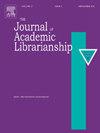Will print books survive? Print book circulation and in-house use at a mid-sized academic library
IF 2.5
3区 管理学
Q2 INFORMATION SCIENCE & LIBRARY SCIENCE
引用次数: 0
Abstract
The Covid-19 pandemic of 2020–2021 accelerated a long-term trend of declining print book use in academic libraries. At Seton Hall University, recovery has been slow, with both checkouts and in-house use still well below pre-Covid levels. Use of the physical library has also decreased. The decrease in print book use is especially notable among students. However, it is less apparent in subject areas that have undergone systematic inventory, removing outdated books and those in the catalog but not on the shelf, and updating of the collections. This makes for more attractive and accurately represented collections with a greater proportion of newer books, which circulate more often than older books. Use of a prominently displayed New Books collection is especially strong and has returned close to pre-Covid levels, while a recently established Leisure collection is also well used. This illustrates the value of small, carefully curated collections. Given the well-documented value of reading and the notion that eBooks should complement rather than replace print collections, we consider ways to promote use of the physical library and its print books. We incorporate ideas and data from public libraries, which are rarely considered in the academic library field.
印刷图书还能生存吗?一家中等规模学术图书馆的印刷图书流通和内部使用情况
2020-2021 年的 Covid-19 大流行加速了学术图书馆印刷图书使用量下降的长期趋势。在塞顿霍尔大学,恢复的速度很慢,借阅率和内部使用率仍远低于 Covid 流行前的水平。实体图书馆的使用率也有所下降。印刷图书使用量的减少在学生中尤为明显。不过,在经过系统清点、删除过期图书和目录中未上架的图书以及更新馆藏的学科领域,这种情况就不那么明显了。这使得藏书更有吸引力,更准确地反映了新书的比例,而新书比旧书流通更频繁。在显著位置展示的新书藏书的使用率特别高,已接近科维德之前的水平,而最近建立的休闲藏书的使用率也很高。这说明了精心策划的小型藏书的价值。鉴于阅读的价值有据可查,以及电子书籍应补充而非取代印刷藏书的理念,我们考虑了如何促进实体图书馆及其印刷书籍的使用。我们采纳了公共图书馆的观点和数据,而学术图书馆领域很少考虑这些观点和数据。
本文章由计算机程序翻译,如有差异,请以英文原文为准。
求助全文
约1分钟内获得全文
求助全文
来源期刊

Journal of Academic Librarianship
INFORMATION SCIENCE & LIBRARY SCIENCE-
CiteScore
5.30
自引率
15.40%
发文量
120
审稿时长
29 days
期刊介绍:
The Journal of Academic Librarianship, an international and refereed journal, publishes articles that focus on problems and issues germane to college and university libraries. JAL provides a forum for authors to present research findings and, where applicable, their practical applications and significance; analyze policies, practices, issues, and trends; speculate about the future of academic librarianship; present analytical bibliographic essays and philosophical treatises. JAL also brings to the attention of its readers information about hundreds of new and recently published books in library and information science, management, scholarly communication, and higher education. JAL, in addition, covers management and discipline-based software and information policy developments.
 求助内容:
求助内容: 应助结果提醒方式:
应助结果提醒方式:


